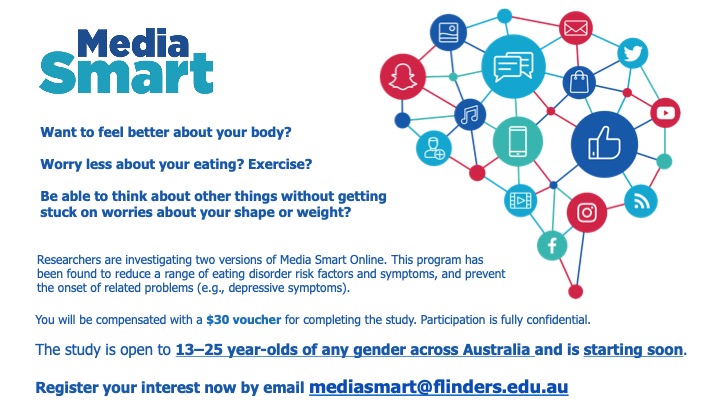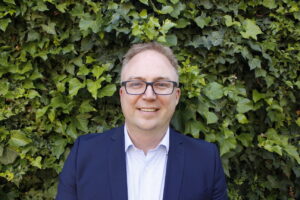Research calls for Australian parents and adolescents with eating disorder experience

Research calls for Australian parents and adolescents with eating disorder experience
Recognition is growing that answers for successful treatments for eating disorders are found through listening to patients and their families. Therefore, I hasten to provide details of two research projects at Flinders University, Australia, which offer fresh opportunity for people with experience to share their stories.
If you have eating disorder experience, either as a family member, caregiver or as person who has developed the illness, read on, and discover how you can participate and make your experience count in helping our researchers to help others.
Senior Research Fellow in Psychology, Dr Simon Wilksch, at Flinders University, Adelaide, explains in a letter to me this week:
Dear June,
Two current areas of my research may interest your readers.
Australia-wide survey of parents of children with an eating disorder
First, I have commenced an Australia-wide survey of parents of children who have experienced an eating disorder in the past five years. The child can be of any age, and the one-off survey takes approximately 15 minutes to complete. No individual (e.g., client, parent, clinician) or service will be identified in the research. This research has been approved by the Flinders University Social and Behavioural Research Ethics Committee (project 8148).
As both a researcher and clinician, I regularly hear the challenging experiences parents face at various stages of the eating disorder journey. Common experiences include: difficulty having a GP recognise the seriousness of the problem; unhelpful comments from health professionals without expertise in the area; lack of support from schools (or in some cases, unhelpful curriculum content); and, a clear lack of support for parents both during the treatment process and afterwards. Health professionals, researchers and those developing policy can learn greatly from parents with lived experience and that is the purpose of this research.
This research has three aims:
- To learn about parent experiences of seeking help for their children;
- To provide a unique perspective on approaches to eating disorder prevention; and
- To learn what parents and carers need to assist their own wellbeing in navigating treatment services and moving on post recovery.
Over the month or so that this has been live, I’ve received about 360 survey completions, which is a great start. I’m hoping to reach 500. Such a number could be valuable in making a case for improved support services for parents, better and quicker early detection of eating problems that can lead to up-skilling of GPs and other service providers, as well as my focus on schools and prevention. I am excited about this research, which I feel is a very under-explored area.
Intervention program on body image for 13-25 year-olds

The second area of research relates to our intervention programs. We currently have two programs that have both shown positive results. Media Smart (a program I developed with Professor Tracey Wade) is an eight-lesson school-based program for young-adolescents that has been shown to lower a range of eating disorder risk factors in both girls and boys – most notably, shape and weight concern over a 2.5 year follow-up. The program is now used in about 40 schools across Australia and Asia and is available for schools to purchase.
A few years ago, we developed Media Smart Online for 18-25 year-old women with body image concerns. Our award winning Australia and NZ-wide random control trial (RCT) achieved very positive results: reduced eating disorder onset by 66% (in those not meeting diagnosis at study start point) and increased eating disorder remission by 75% (for those meeting diagnosis at baseline), relative to controls at 12-month follow-up.
A range of other risk factors also improved, along with lowering the likelihood of onset of depressive symptoms and thoughts about self-harm. Thus, while Media Smart Online is intended to be a prevention program for those at-risk of an eating disorder or who simply want to improve their body image, it was also found to be helpful as an early intervention program for those already with an eating disorder.
We now have a Rotary Mental Health grant to expand this research:
1) To see if the program is beneficial for a wider audience (13-25 year-olds of any gender) than our first RCT (18-25 year-old women)
2) To compare efficacy and retention rates for a weekly release of the modules vs a flexible rate of program completion (user chooses own rate).
The study will go live in 2020 but we wish to create a database of email addresses for interested people to fast track the recruitment process. This research has been approved by the Flinders University Social and Behavioural Research Ethics Committee (Project 8287)
Registration involves simply emailing mediasmart@flinders.edu.au
I will be most grateful if readers can please share these two research studies with their networks to maximise the benefit and value of both studies.
About Simon
 Simon is both a researcher and clinician in the area of eating disorders based in Adelaide, South Australia. He is a Senior Research Fellow at Flinders University leading projects in the area of eating disorder risk factors, prevention, early intervention and improving treatment experience and outcomes for patients and their families.
Simon is both a researcher and clinician in the area of eating disorders based in Adelaide, South Australia. He is a Senior Research Fellow at Flinders University leading projects in the area of eating disorder risk factors, prevention, early intervention and improving treatment experience and outcomes for patients and their families.
Simon is also a Clinic Director at Advanced Psychology Services a large service providing eating disorder treatment to over 200 children, adolescents and adults each year.
Simon and Tracey Wade developed Media Smart a leading school-based eating disorder risk reduction program for young-adolescents. More recently they have developed Media Smart Online for those with body image concerns. The program has shown many positive results. 13-25-year-olds interested in participating in the upcoming new trial can email mediasmart@flinders.edu.au
Simon is passionate about preventing eating disorders and improving the care and treatment experiences of those who experience these very serious problems and their loved ones. He has contributed to the field in many ways including: serving on a range of committees in the development of the State-wide Eating Disorder Service and the upcoming State-wide Paediatric Eating Disorder Service; being the Scientific Chair for the 2019 Australian and New Zealand Academy for Eating Disorders conference; and, serving on the Executive of the Australian and New Zealand Academy for Eating Disorders.





